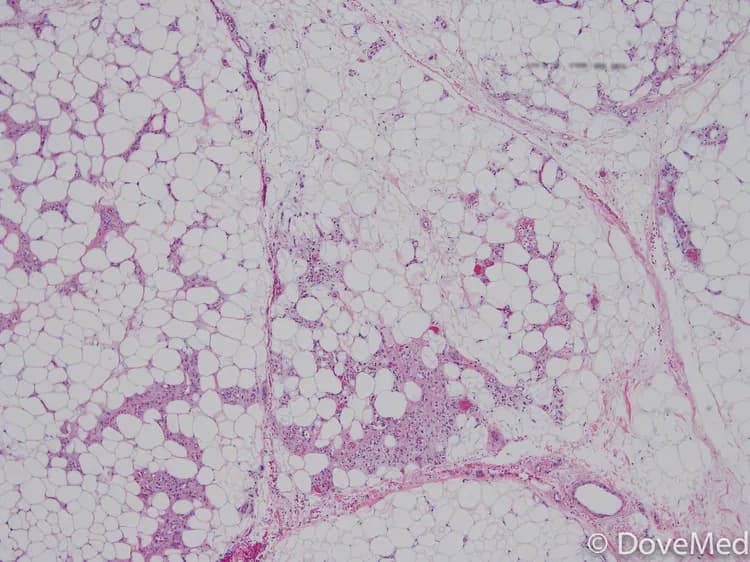What are the other Names for this Condition? (Also known as/Synonyms)
- Fibromyolipoma
- Hemangiolipoma
- Vascular Lipoma
What is Angiolipoma? (Definition/Background Information)
- An Angiolipoma is a kind of benign tumor that has a combination of benign fatty tissue and benign blood vessels
- They are often multiple and occur as subcutaneous painful nodules, mostly on the forearm. Young adult men are most commonly affected
- There are no identified risk factors for Angiolipoma and the cause is unknown
- The tumors may be asymptomatic, but they may cause severe pain. In such cases, a complete excision of Angiolipoma is considered curative and the prognosis is also excellent
Who gets Angiolipoma? (Age and Sex Distribution)
- Angiolipomas are usually found in young adults in the 20-30 years age group
- Both males and females are affected, though the incidence of Angiolipoma is higher in males
- There is no racial or ethnic preference observed
What are the Risk Factors for Angiolipoma? (Predisposing Factors)
- The risk factors for Angiolipomas are currently unknown, or have not been established
- Some cases are observed to run in families
It is important to note that having a risk factor does not mean that one will get the condition. A risk factor increases ones chances of getting a condition compared to an individual without the risk factors. Some risk factors are more important than others.
Also, not having a risk factor does not mean that an individual will not get the condition. It is always important to discuss the effect of risk factors with your healthcare provider.
What are the Causes of Angiolipoma? (Etiology)
The exact cause and mechanism of Angiolipoma formation is unknown.
What are the Signs and Symptoms of Angiolipoma?
The signs and symptoms of Angiolipoma are:
- A number of subcutaneous tumors may be observed at several locations of the body
- Most common location of the tumor is the forearm. Other locations include the arm, chest, back, and lower legs
- The nodules are well-circumscribed and may be painful
- Some tumors may not present any signs or symptoms, other than a mass
How is Angiolipoma Diagnosed?
Angiolipoma is diagnosed using the following tools:
- Complete physical examination with comprehensive evaluation of medical history
- Radiographic studies of the affected region
- Tissue biopsy: A tissue biopsy is performed and sent to a laboratory for a pathological examination. The pathologist examines the biopsy under a microscope. After putting together clinical findings, special studies on tissues (if needed) and with microscope findings, the pathologist arrives at a definitive diagnosis
- A differential diagnosis may be used to eliminate other tumor types
Many clinical conditions may have similar signs and symptoms. Your healthcare provider may perform additional tests to rule out other clinical conditions to arrive at a definitive diagnosis.
What are the possible Complications of Angiolipoma?
Complications due to Angiolipoma could include:
- Severe pain
- Recurrence of the tumor after surgery, if it is incompletely removed
- Damage to vital nerves, blood vessels, and surrounding structures during surgery to remove Angiolipoma
How is Angiolipoma Treated?
Treatment measures for Angiolipoma include the following:
- If there are no symptoms, then conservative treatment may be helpful. However, periodic observation is maintained and if there is any pain, it can be controlled through pain medication
- Surgical excision with removal of the entire tumor is the standard treatment method used. If the lesion is not fully removed, then there are chances of its recurrence
- Post-operative care is important: One must maintain minimum activity levels, until the surgical wound heals
- Post-operative follow-up care with regular screening and check-ups are important, especially to monitor for any recurrences
How can Angiolipoma be Prevented?
Current medical research has not established a way of preventing Angiolipoma.
What is the Prognosis of Angiolipoma? (Outcomes/Resolutions)
- Many Angiolipomas are asymptomatic or may display only mild symptoms. Such tumors may not require any treatment
- The prognosis is generally very good when the tumors are small (and few in numbers) and are completely excised. In such cases, their recurrence risk can also be entirely avoided
Additional and Relevant Useful Information for Angiolipoma:
Painful tumors occurring under the skin are grouped under the acronym “ANGEL”, which is: Angiolipoma, Neuroma, Glomus tumor, Eccrine spiradenoma, and Leiomyoma.
Related Articles
Test Your Knowledge
Asked by users
Related Centers
Related Specialties
Related Physicians
Related Procedures
Related Resources
Join DoveHubs
and connect with fellow professionals


0 Comments
Please log in to post a comment.